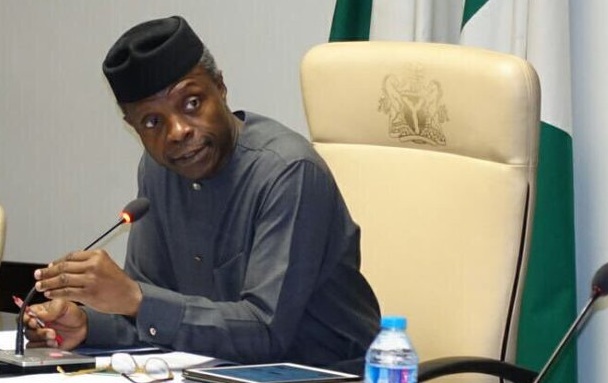The Vice President, Prof. Yemi Osinbajo, went down memory lane during his condolence visit to the family of the late Justice Bolarinwa Babalakin in Gbogan, Osun State yesterday, recalling the vital efforts he made to get President Olusegun Obasanjo to change his mind when his government withheld the local government funds of Lagos State in 2003.
Osinbajo’s visit to the Babalakin family occurred after he had delivered a speech at the 45th convocation of Obafemi Awolowo University (OAU) in Ile-Ife, also in Osun State, where he lamented the security situation in the country, especially the rise of terrorism and access to illegal weapons by non-state actors.
Recalling the face-off between the Lagos State Government and the Obasanjo administration over the withheld local government funds at a time Asiwaju Bola Ahmed Tinubu held sway as the governor of the state, Osinbajo said: “When I heard about the passing of our father, Babalakin, I called Adewale when he was abroad. I told him that this is not just a loss for him and the family but a great loss for all of us his friend, the legal profession and even the Yoruba race. Baba was so credible.
“I remember in 2003 when we had a problem with Obasanjo in Lagos, he held unto our local government funds and it was after the Supreme Court had given us judgment and he refused to hand over the money.
“We were going back and forth on it, so we were looking for somebody who would be respected by both Obasanjo and ourselves, who we knew would be considered credible by both sides, and everybody agreed that Justice Babalakin would be the right person. He advised that ultimately, we would resolve the issue with a kind of negotiation.
– Advertisement –
“He spoke very frankly to Obasanjo because later on, we got feedback on how he spoke to him. In the end, we all left having the feeling that we had someone fair, just, frank with all of us.”
He added that Justice Babalakin was respected by the bar and bench, noting that he was trusted and straightforward.
“This is a big loss for our nation especially at a time when we need credible people who can negotiate a lot of the problems and issues that are confronting us as a nation,” he said.
Osun state governor, Gboyega Oyetola who was also in the company of Osinbajo prayed to God to give the family the fortitude to bear the loss.
His counterpart from Ondo State, Rotimi Akeredolu, also recalled that “we were groomed in the same branch of the Nigeria Bar Association in Ibadan.”
Speaking earlier at the 45th convocation of OAU, Vice President Osinbajo said the politicisation of our means of purchasing weapons should tell us that we must manufacture our own arms.
Osinbajo lamented the security situation in the country, especially the rise of terrorism and access to illegal weapons by non-state actors.
He said: “We must be smarter in policing the country using smart drones and surveillance equipment.
“The politicisation of our means of the purchase of weapons tells us that we must manufacture our own arms.
“Already, some Nigerian companies led by Profex, a Nigerian company, is already manufacturing APCs and exporting them to several African countries.
“Other companies and government-owned Dicom is manufacturing different types of ammunition.
“Yes, the challenges are much, but the means to resolve it and the elements are here already. Young Nigerians are rising to the challenges facing the country.
“It is however said, right here in Ife, that it is effective economic planning and even more, effective implementation that could help us to avoid a disaster and make phenomenal progress.
“And so our national development plan 2021-2025 is an attempt to chart a path for the future. The future belongs far more to you graduands, so you need to pay more attention to it.”
Ondo State governor, Rotimi Akeredolu, delivering his convocation lecture titled “When is a Nation? Exploring the Socio-Political Crisis in Post Independence Nigeria”, said “the 1999 Constitution, as amended, is a document which lies against itself and cannot be relied upon to administer a country as vast and divergent as Nigeria.
According to him, “the over-centralisation of authority at the centre is at the root of the current crises in the country. No serious foundation for development can be laid on the fertile ground of mutual suspicion by the ethnic nationalities which form the country.
“No amount of coercion can pacify agitations for equity and justice in a country where the basis law militates against development such as the aberrant document known as 1999 Constitution.”
He noted that the south stands on producing the next president of the country, calling for the return to the regional system of government, saying that over-centralisation of authority at the centre is the root of the current crises in the country.
Source: The Nation

